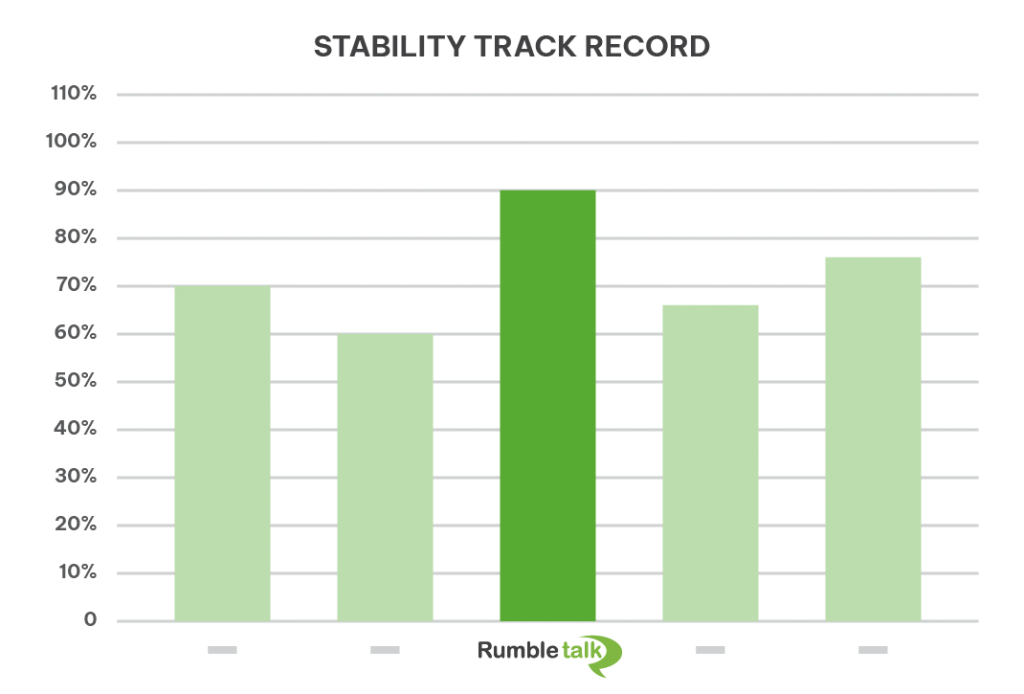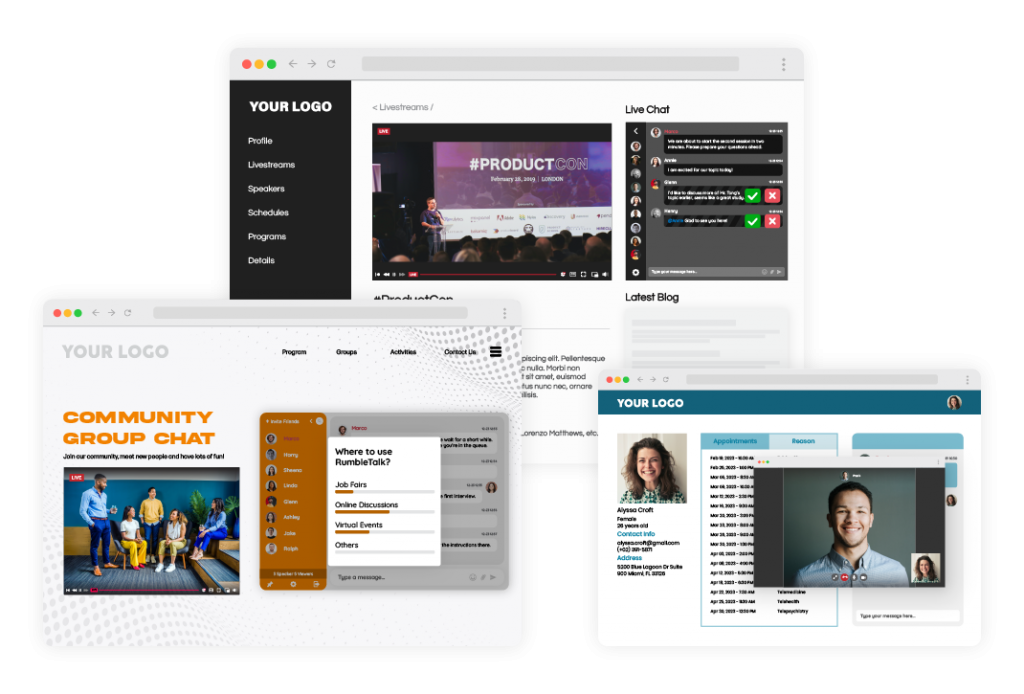Group chat platforms have emerged as indispensable mediums for fostering real-time conversations, whether for business, education, or social purposes. In the past years, there has been a growing usage of chat rooms and group chats.
However, in the landscape of group chat for websites, one often overlooked but crucial factor is – stability. The stability of a group chat platform can significantly impact its usability, reliability, and overall user experience.

Let’s explore why stability is an important decision factor for group chat usage.
Understanding the Significance of Stability and How it Affects Group Chat Usage
Stability, in the context of group chat platforms, refers to the consistent performance, uptime, and responsiveness of the application. It encompasses the ability of the platform to handle multiple users simultaneously, maintain smooth functioning during peak usage times, and avoid disruptions such as crashes or downtime.
While features and functionalities play a crucial role in the selection of a group chat platform, stability is the foundation upon which all interactions are built.
Many of us have encountered persistent issues with a specific product component – that dreaded checkout cart feature, perhaps – or even with the product as a whole.
When these problems afflict customer-facing products, they can have severe consequences for your customers, tarnish your company’s reputation, and erode profit margins. When such issues arise with internal-facing products, they disrupt workflows and hamper employee efficiency.
A study conducted by researchers Alan R. Dennis and Susan G. C. Clarke, published in the Journal of Computer-Mediated Communication, emphasizes the importance of stability in virtual group discussions. The study found that participants’ perceptions of stability significantly influenced their attitudes and behaviors within a group chat setting.
Unstable platforms, characterized by lags, crashes, or unreliable connectivity, led to frustration, disengagement, and a negative perception of the overall communication experience. On the contrary, a stable platform fostered positive interactions, increased participation, and higher levels of satisfaction among users.
Ensuring the reliability and stability of your product is intrinsically linked to the overall success of your software and, consequently, your business. Unfortunately, in today’s landscape, characterized by startups, legacy code, and technical debt, software stability remains a pressing concern.
Downtime Costs Money
Downtime is the amount of time a service is unavailable due to technical issues or maintenance. This can be costly for businesses, especially those that rely heavily on group chat for communication and collaboration. When a group chat platform experiences downtime, it can lead to missed messages and delayed responses. This can also result in lost revenue.
Every business sets sales targets to achieve, but during an outage, you become susceptible to substantial losses that can significantly impact your annual revenue.
If your sales channel becomes inactive, customers are unable to make purchases, and with every passing hour of service downtime, potential earnings quickly dissipate.
The duration of the outage directly correlates with the severity of its impact on your business, a fact supported by empirical evidence. In a study conducted by Forrester, numerous IT leaders were questioned regarding the costs their organizations incurred due to both planned and unplanned downtime:
- 53% of respondents cited lost revenue.
- 47% highlighted lost productivity.
- 41% emphasized the erosion of brand equity and trust.
Security Concerns

Chat platforms that experience frequent downtime may also have security concerns. When a platform is down, it may be vulnerable to cyber attacks or data breaches. This can put sensitive business information at risk and lead to costly legal and financial repercussions.
After meticulously fine-tuning all configurations to ensure a deployed product runs seamlessly, few things are as unsettling as a vendor introducing a new product that could potentially disrupt your meticulously orchestrated tech ecosystem.
To put it plainly, many individuals have experienced the disappointment of eagerly adopting the latest and supposedly greatest software, only to find that it not only disrupts their workflow but, in some cases, brings production to a standstill.
This represents the age-old conflict between operational efficiency and security concerns; they don’t always align perfectly. While everything may appear to be running smoothly, the emergence of an exploit that could be exploited by malicious actors to compromise the organization can lead to a perception that the security team is overly cautious when suggesting changes, which in turn poses a threat to the stability of an otherwise well-functioning environment.
In other scenarios, the security team may be stretched too thin to keep up with necessary updates, fostering a sense of “upgrade resistance” even within their own ranks.
Reputation Damage
Chat platforms that experience frequent downtime can also damage a company’s reputation. While it’s impossible to guarantee 100% protection against data breaches, establishing the right frameworks and fostering a culture that prioritizes security can significantly reduce the associated risks.
According to a report, 46% of organizations have experienced damage to their reputation as a result of a data breach, with an additional 19% suffering reputational and brand damage due to third-party security breaches.
The likelihood is high that nearly everyone with an email address, social media presence, or who shops online has been impacted by a data breach in some form—ranging from social media hacks to substantial financial losses. If individuals have experienced such incidents, it’s safe to assume that large brands are also susceptible to them on a larger scale. In fact, major brands have indeed fallen victim to such extensive breaches, often incurring substantial financial losses as a result.
Undoubtedly, safeguarding customer data has assumed paramount importance. Email correspondence and customer databases frequently house sensitive information, encompassing contact details and payment data. In today’s landscape, businesses adhere to stringent email compliance regulations to shield customer information, mitigate legal risks, and safeguard their reputation.
In the unfortunate event of a data breach leading to the exposure of private customer information, it’s only natural to anticipate a loss of trust on the part of customers in your business.
Productivity Loss
When a group chat platform experiences downtime, it can lead to lost productivity. Team members may have to resort to using other communication tools, such as email or phone. These can be slower and less efficient. It can also result in delays in decision-making and missed deadlines.
For the majority of employees, computer proficiency has become an indispensable work skill, integrated seamlessly into their job responsibilities.
However, the significance of computers, and Information Technology (IT) more broadly, transcends its impact on daily work routines. IT streamlines and, in some cases, eliminates various tasks, enabling companies to compete effectively while fostering transparency and innovation in their products, services, and processes.
Multiple studies underscore the pivotal role of IT in the substantial increase in national economic productivity over recent decades. Many employees can relate to experiences such as waiting on hold due to a computer-related delay or losing valuable time when servers malfunction. They have also encountered the frustration of being unable to access company systems remotely.
Possible solutions encompass effective training, an expanded role for the helpdesk, and enhanced support from informal networks like colleagues. These measures hold the potential to reduce productivity losses.
RumbleTalk’s Stability Track Record

RumbleTalk is a group chat platform that has been in operation since 2010. The platform has a proven track record of stability, with an uptime of above 90%. This means that the platform is highly reliable. Users can count on it to be available when they need it.
What features does RumbleTalk provide for businesses that are looking into long-term usage?
Robust Infrastructure
RumbleTalk boasts a robust infrastructure designed to accommodate large numbers of users without compromising performance. The platform’s architecture is optimized to handle concurrent interactions seamlessly, ensuring minimal disruptions during discussions.
The platform has spearheaded several events including SIGGRAPH 2023, Holistic Psychotherapy Summit, and CES Tech 2023. RumbleTalk’s smooth performance even during high-traffic periods enhances the overall user experience. Whether used for educational webinars, business meetings, or community gatherings, the stability of the chat platform remains unwavering.
Contingency Plan
RumbleTalk also has a robust disaster recovery plan in place. In the event of any downtime, the platform has a backup system that ensures that no messages are lost. We have a team of experts who monitor the system 24/7 and respond to any issues promptly.
Security Measures
RumbleTalk takes security seriously and has implemented several measures to ensure that the platform is secure including SSL and other measures. RumbleTalk also complies with GDPR and HIPAA regulations, ensuring that user data is protected and handled appropriately. If a user wants to delete their account or any data, we comply with it. No questions asked.
Customer Service
In addition to being stable, RumbleTalk offers excellent customer support. The platform has a dedicated support team that is available to answer any questions or concerns that users may have. Our team is responsive and knowledgeable, ensuring that users can get the help they need quickly.
Inclusive and Engaging Conversations
Stability directly influences the inclusivity and engagement levels within group chat conversations. A stable platform eliminates barriers to participation, enabling users to contribute without the fear of technical glitches hindering their input. In educational settings, for instance, stability ensures that students and educators can interact seamlessly, ask questions, and exchange ideas without interruptions. When users are given a stable platform, their group chat usage increases.
Additionally, stability contributes to the establishment of a comfortable and welcoming atmosphere. Participants are more likely to engage in meaningful discussions and build relationships when they are not hindered by technological uncertainties. This is especially pertinent in virtual event settings, where attendees from diverse backgrounds come together to share insights and experiences.
Why stability is the endgame for group chat usage

In summary, stability is an important decision factor for group chat usage. Downtime can be costly for businesses, lead to security concerns, damage a company’s reputation, and result in lost productivity.
When choosing a group chat platform, it’s essential to consider the provider’s track record of stability and uptime. It’s also crucial that the provider has recovery measures in place to minimize the impact of any downtime.
By choosing a stable and reliable group chat platform, businesses can ensure that their communication and collaboration efforts are efficient, secure, and productive.
RumbleTalk addresses all of these concerns well. Our platform has a proven track record of stability, a backup recovery plan, and strong security measures. Additionally, we offer excellent customer support, making sure we cater to our customer.
By choosing RumbleTalk chat, businesses can ensure that their communication and collaboration efforts are efficient, secure, and productive.
Want to schedule a demo? Contact us at https://rumbletalk.com/about_us/contact_us/.


